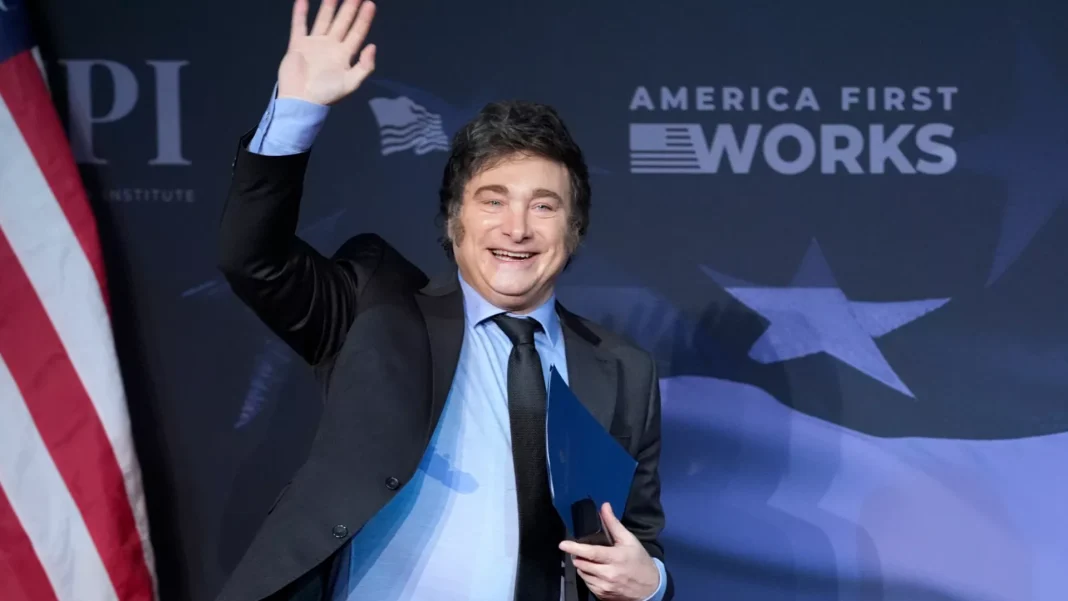April 09, 2025
IMF Reaches $20 Billion Deal with Argentina, Offering Relief to Milei’s Economic Overhaul
The International Monetary Fund (IMF) announced Tuesday it has reached a preliminary $20 billion (€18.1bn) bailout agreement with Argentina, offering much-needed relief to President Javier Milei as he pushes forward with his sweeping economic reforms.
While still pending approval from the IMF’s executive board, the staff-level deal marks a significant step toward stabilising Argentina’s fragile economy. The board is expected to review the agreement in the coming days.
President Milei’s free-market, austerity-driven agenda has begun to curb inflation and restore confidence in Argentina’s financial system, reversing years of economic turmoil under previous populist governments. With more IMF bailouts than any other country, Argentina is once again relying on international support to reset its fiscal path.
The deal comes at a pivotal moment for South America’s second-largest economy, as Argentina grapples with dwindling foreign exchange reserves. With the government cracking down on money-printing and rapidly spending its limited U.S. dollars to stabilize the fragile peso, pressure had been mounting.
Concerns were growing that without fresh IMF support, President Milei’s hard-won austerity measures could falter—risking a return to debt default and jeopardizing the country’s ability to cover import costs.
The new IMF funding gives President Javier Milei a real opportunity to ease Argentina’s strict foreign exchange controls—an essential step toward reassuring global markets about the viability of his economic overhaul. For the past six years, capital controls have deterred foreign investment by restricting companies from repatriating profits and forcing the central bank to tightly manage the peso’s peg to the U.S. dollar.
Argentina has now taken out 22 IMF loans since 1958 and owes the fund over $40 billion (€36.2bn). Much of that money has been used simply to repay previous IMF loans, fueling resentment among Argentines who still blame the institution for the country’s devastating 2001 default and economic collapse.
Given this troubled history, the IMF was cautious about signing another agreement with its largest borrower. But Milei’s aggressive economic reforms—far more austere than the Fund’s typical recommendations—have won praise in Washington over the past 16 months.
A former TV pundit and self-described “anarcho-capitalist,” Milei came to office promising to dismantle Argentina’s bloated state, crush inflation, liberalize the economy, and lure back foreign investors. Unlike his predecessors, who feared public backlash over tough reforms, Milei has doubled down—firing tens of thousands of government workers, downsizing ministries, slashing pensions and education budgets, halting public works, ending price controls, and cutting subsidies across the board.
Critics argue that Argentina’s poorest citizens are bearing the brunt of the country’s improving economic indicators. Retirees, in particular, have been staging weekly protests over meager pension payments—by far the largest target of President Javier Milei’s budget cuts. In response, major labor unions have called a 36-hour general strike starting Wednesday to express solidarity with those impacted.
Despite the backlash, Milei has maintained unexpectedly strong approval ratings. Analysts credit this resilience to his success in slashing inflation—from 211% to 118% annually in just one year—and reversing persistent budget deficits. These shifts have helped fuel a stock market rally and significantly lowered Argentina’s country-risk rating, a key measure of investor sentiment.
The IMF acknowledged these achievements in announcing the new bailout deal, stating: “The agreement builds on the authorities’ impressive early progress in stabilizing the economy, underpinned by a strong fiscal anchor, that is delivering rapid disinflation.” The 48-month program, the Fund added, supports the next phase of Argentina’s homegrown economic reform plan.
However, questions remain about how much of the $20 billion package Argentina will receive upfront—a crucial point in the final stage of negotiations. While IMF disbursements typically roll out over time, Argentina is pushing for a sizable initial payment to shore up its depleted reserves.
President Milei celebrated the announcement on social media platform X, sharing a photo of himself hugging Economy Minister Luis Caputo. His caption? “Vavos!”—a likely misspelling of Vamos! (“Let’s go!”)—in a burst of excitement.
(Source)
